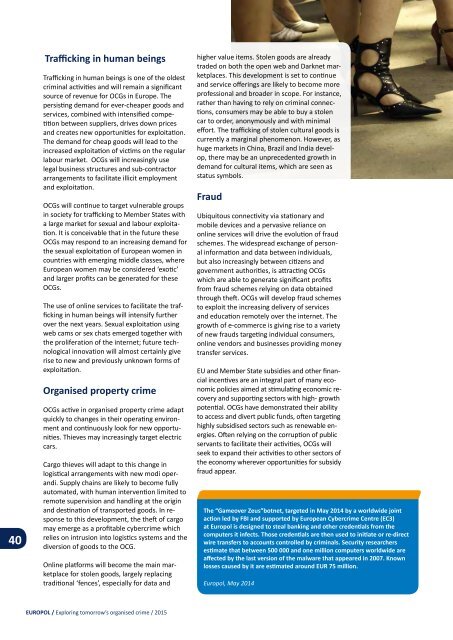eu-europol-org-crime-report
eu-europol-org-crime-report
eu-europol-org-crime-report
Create successful ePaper yourself
Turn your PDF publications into a flip-book with our unique Google optimized e-Paper software.
40<br />
Trafficking in human beings<br />
Trafficking in human beings is one of the oldest<br />
criminal activities and will remain a significant<br />
source of revenue for OCGs in Europe. The<br />
persisting demand for ever-cheaper goods and<br />
services, combined with intensified competition<br />
between suppliers, drives down prices<br />
and creates new opportunities for exploitation.<br />
The demand for cheap goods will lead to the<br />
increased exploitation of victims on the regular<br />
labour market. OCGs will increasingly use<br />
legal business structures and sub-contractor<br />
arrangements to facilitate illicit employment<br />
and exploitation.<br />
OCGs will continue to target vulnerable groups<br />
in society for trafficking to Member States with<br />
a large market for sexual and labour exploitation.<br />
It is conceivable that in the future these<br />
OCGs may respond to an increasing demand for<br />
the sexual exploitation of European women in<br />
countries with emerging middle classes, where<br />
European women may be considered ‘exotic’<br />
and larger profits can be generated for these<br />
OCGs.<br />
The use of online services to facilitate the trafficking<br />
in human beings will intensify further<br />
over the next years. Sexual exploitation using<br />
web cams or sex chats emerged together with<br />
the proliferation of the internet; future technological<br />
innovation will almost certainly give<br />
rise to new and previously unknown forms of<br />
exploitation.<br />
Organised property <strong>crime</strong><br />
OCGs active in <strong>org</strong>anised property <strong>crime</strong> adapt<br />
quickly to changes in their operating environment<br />
and continuously look for new opportunities.<br />
Thieves may increasingly target electric<br />
cars.<br />
Cargo thieves will adapt to this change in<br />
logistical arrangements with new modi operandi.<br />
Supply chains are likely to become fully<br />
automated, with human intervention limited to<br />
remote supervision and handling at the origin<br />
and destination of transported goods. In response<br />
to this development, the theft of cargo<br />
may emerge as a profitable cyber<strong>crime</strong> which<br />
relies on intrusion into logistics systems and the<br />
diversion of goods to the OCG.<br />
Online platforms will become the main marketplace<br />
for stolen goods, largely replacing<br />
traditional ‘fences’, especially for data and<br />
higher value items. Stolen goods are already<br />
traded on both the open web and Darknet marketplaces.<br />
This development is set to continue<br />
and service offerings are likely to become more<br />
professional and broader in scope. For instance,<br />
rather than having to rely on criminal connections,<br />
consumers may be able to buy a stolen<br />
car to order, anonymously and with minimal<br />
effort. The trafficking of stolen cultural goods is<br />
currently a marginal phenomenon. However, as<br />
huge markets in China, Brazil and India develop,<br />
there may be an unprecedented growth in<br />
demand for cultural items, which are seen as<br />
status symbols.<br />
Fraud<br />
Ubiquitous connectivity via stationary and<br />
mobile devices and a pervasive reliance on<br />
online services will drive the evolution of fraud<br />
schemes. The widespread exchange of personal<br />
information and data between individuals,<br />
but also increasingly between citizens and<br />
government authorities, is attracting OCGs<br />
which are able to generate significant profits<br />
from fraud schemes relying on data obtained<br />
through theft. OCGs will develop fraud schemes<br />
to exploit the increasing delivery of services<br />
and education remotely over the internet. The<br />
growth of e-commerce is giving rise to a variety<br />
of new frauds targeting individual consumers,<br />
online vendors and businesses providing money<br />
transfer services.<br />
EU and Member State subsidies and other financial<br />
incentives are an integral part of many economic<br />
policies aimed at stimulating economic recovery<br />
and supporting sectors with high- growth<br />
potential. OCGs have demonstrated their ability<br />
to access and divert public funds, often targeting<br />
highly subsidised sectors such as renewable energies.<br />
Often relying on the corruption of public<br />
servants to facilitate their activities, OCGs will<br />
seek to expand their activities to other sectors of<br />
the economy wherever opportunities for subsidy<br />
fraud appear.<br />
The “Gameover Z<strong>eu</strong>s”botnet, targeted in May 2014 by a worldwide joint<br />
action led by FBI and supported by European Cyber<strong>crime</strong> Centre (EC3)<br />
at Europol is designed to steal banking and other credentials from the<br />
computers it infects. Those credentials are then used to initiate or re-direct<br />
wire transfers to accounts controlled by criminals. Security researchers<br />
estimate that between 500 000 and one million computers worldwide are<br />
affected by the last version of the malware that appeared in 2007. Known<br />
losses caused by it are estimated around EUR 75 million.<br />
Europol, May 2014<br />
EUROPOL / Exploring tomorrow’s <strong>org</strong>anised <strong>crime</strong> / 2015


